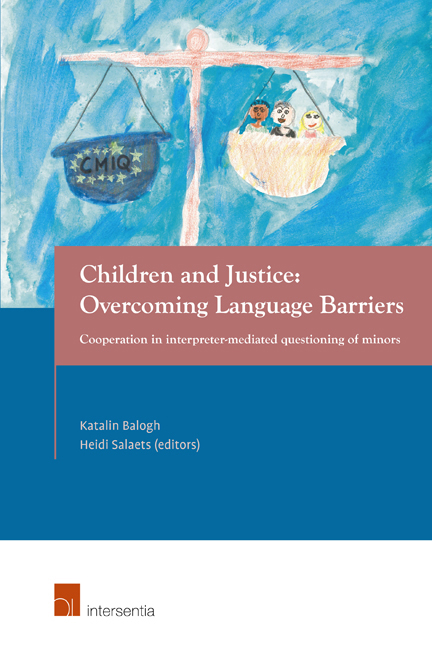 Children and Justice: Overcoming Language Barriers
Children and Justice: Overcoming Language Barriers Chapter 1 - Introduction
Published online by Cambridge University Press: 22 November 2017
Summary
DEFINITIONS AND GENERAL FRAMEWORK
THE CO-MINOR-IN/QUEST PROJECT
A twelve-year-old German boy is returning from a trip to Spain with his parents. On the way home, the family is carjacked and robbed at a lay-by along the motorway. The parents are seriously injured by two armed carjackers who steal the family's car and all their valuables, leaving the parents for dead in the middle of the night, with their son. When the police arrive at the crime scene, they find the terrified and injured family who are immediately taken to hospital. As both parents are seriously injured, they cannot be interviewed yet. Initially, the police can only rely on the son's statement to track down the offenders. However, the boy does not speak Spanish, except for a few words picked up from the children he played with near the holiday home. How will the police communicate with him? How can the interview team ensure that the conversation with the potentially traumatized boy runs as smoothly as possible? In what ways can they provide adequate protection and support? These are the main issues the CO-Minor-IN/QUEST project dealt with and which will be reflected in this publication.
The CO-Minor-IN/QUEST project (Cooperation in Interpreter-Mediated Questioning of Minors: JUST/201 l/JPEN/AG/2961) belonged to the Criminal Justice Support Programme, set up by the Directorate-General Justice (DG Justice) of the European Commission to co-finance project actions that ‘promote judicial cooperation within the field of criminal justice’. In the spirit of this programme, the CO-Minor-IN/QUEST project aimed at improving international cooperation between all EU member states, and particularly those belonging to the project consortium: Belgium, France, Hungary, Italy, the Netherlands and the United Kingdom. The following project partners participated in this two-year research project (January 2013 - December 2014) focused on improving interpreter-mediated child interviews.
- KU Leuven (University of Leuven) (Belgium): project co-ordinator;
- ISIT: Institut de management et de communication interculturels (Institute of Intercultural Management and Communication) (France);
- ESZTER Alapitvany az Eroszakos Szexualis Tamadast Elszenvedettek Rehabilitaciojara (Eszter Foundation) (Hungary);
- Universita di Bologna (Bologna University) (Italy);
- Heriot-Watt University, Edinburgh (United Kingdom);
- Raad voor Rechtsbijstand (Legal Aid Board) (Netherlands);
- Ministerie van Veiligheid en Justitie (Ministry of Security and Justice) (Netherlands).
Another salient feature of the CO-Minor project, as well as its international orientation, is its multidisciplinary approach.
- Type
- Chapter
- Information
- Children and Justice: Overcoming Language BarriersCooperation in interpreter-mediated questioning of minors, pp. 1 - 46Publisher: IntersentiaPrint publication year: 2015
